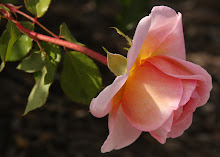And he (King Josiah) put down the idolatrous
priests, whom the kings of Judah had ordained to burn
incense in the high places in the cities of Judah...;
them also that burned incense to Baal, to the sun,
and to the moon, and to the planets, and to all
the host of heaven.
II Kings 23:5
I have always been curious about the other planets in our solar system - but none more so than Mars, the "red planet." Easily seen from earth with the naked eye, Mars is the fourth planet from the sun and the second smallest in our solar system. Like every other child of my era, I often wondered what it would be like to visit the moon or take a trip to Mars. I never dreamed, growing up, that man would have machines roving the surface of the red planet in my lifetime. Mars currently hosts five functioning spacecrafts: three in orbit - the Odyssey, the Express, and the Mars Reconnaissance Orbiter; and two on the ground - The Opportunity exploration rover, and The Curiosity science lab.
The picture above is a landscape shot sitting in the crater where Curiosity landed. The picture below shows Mount Sharp on the Martian surface.
It looks like something out of a fairytale book. It is somewhat difficult to believe that while I sit here this evening tapping away on my computer keyboard, Curiosity is roving across the surface of a far-away planet, taking amazing pictures and investigating, among other things, the planetary habitability of Mars.
The verse above, in the book of II Kings is the only mention in the Bible of planets (or heavenly bodies). On the fourth day of creation, however, when God created the sun, moon and stars, the creation of the planets were surely a part of that day's process. Our earth is lush and plush in contrast with the stark barrenness of Gale Crater and the landscape of Mars. Perhaps it was not always that bleak. I hope that Curiosity will provide scientists with the great deal of raw data and images that will answer many of our questions about the history and sustainability of Mars.



No comments:
Post a Comment